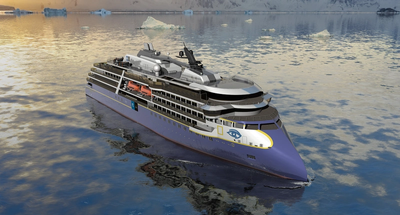ABB Wins Total Solution For Polar Newbuild
ABB will deliver a comprehensive scope of power, automation, propulsion and digital solutions for the new Lindblad Expeditions Holdings, Inc. vessel that will take passengers on exploration cruises in remote polar areas.
Designed with a focus on safety, environmental sustainability and comfort, this ice-going vessel will be equipped with ABB’s power and automation solutions, as well as two Azipod DO propulsion units. ABB is the only supplier of azimuthing electric podded propulsor systems of sufficiently high ice-going class able to meet the owner’s requirements.
The polar explorer is designed by Ulstein Design & Solutions and will be constructed by the Norwegian yard Ulstein Verft. The vessel will be delivered in the first quarter of 2020.
The vessel, dubbed “the world’s foremost expedition ship”, will let passengers connect with the outside environment through specially designed observation areas, as well as allow easy access to off-ship exploring. It will feature 69 guest cabins and onboard facilities fit for the most demanding travelers.
“We are excited to partner with ABB to help build our blue water vessel, one of the most technologically advanced expedition vessels in the industry,” said Nikolaos G Doulis, Senior Vice President, New Buildings, Lindblad Expeditions. “Our selection of ABB is based on our experience of them as a reliable, innovative partner. ABB Azipod propulsion offers major safety benefits for our vessel with exceptional fuel consumption, high performance in demanding ice conditions, and remarkably improved onboard comfort.”
“The emergence of a distinct market for expedition cruise ships bound for polar waters plays into two areas of ABB expertise,” said Juha Koskela, Managing Director, ABB Marine & Ports. “Electrical solutions are more reliable, efficient and environmentally responsible than their mechanical counterparts, as well as better aligned with digitalization. Similarly, Azipod propulsion achieves greater maneuverability and improves passenger and crew comfort on board, while its gearless construction reduces environmental risk.”
In addition to enabling the vessel to navigate through sea ice and meet regulations for operating in Arctic and Antarctic waters, Azipod DO units require 25% less installed power than propulsors of equivalent performance.
ABB Ability System 800xA will further improve efficiency and safety of the polar newbuild. It integrates power, propulsion and vessel management systems into one platform, enabling both crew and onshore teams to get a comprehensive overview of all the information needed to operate the vessel in the optimal way. All control and monitoring applications have a uniform look and feel, allowing for a more intuitive user experience. Leveraging ABB Ability™ Collaborative Operations, the vessel will be connected to ABB’s Collaborative Operations Center infrastructure, which monitors the performance of ABB technology on board and remotely connects operators with ABB experts. This can be particularly crucial for vessels operating in remote areas.
Ulstein holds options to build two additional ships for Lindblad Expeditions Holdings, Inc. to the same design.
“We are very aware of plans to build luxury ships with sufficient ice-breaking strength to follow the course set by the great polar explorers,” said Juha Koskela, Managing Director, ABB Marine & Ports. “We are also aware that these most adventurous of owners are already planning to choose hybrid electric propulsion and integrated solutions that enable an increasing level of automation.”
Just as vital to the support of the expanding expedition cruise market will be ABB’s unfolding “Electric. Digital. Connected.” strategy, part of which is focused on seven land-based centers coordinating remote equipment analysis, monitoring and diagnostics, and predictive maintenance services. ABB estimates that the approach reduces on-call vessel visits of service engineers by up to 70%, while docking costs can be cut by up to 50%.













